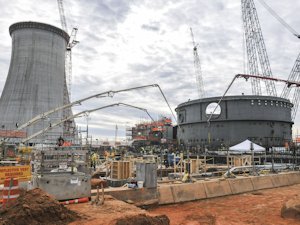
The Candidates 2016 and Energy
The energy industry in America is so subsidized, strictly regulated, and dependant on government that it might as well be an official federal agency. As such, a president's opinion about what energy sources would best provide for the country and its infrastructure is enormously important. If you've stuck with me this long, you know where I stand: I think the free market can do better than central planning. That said, I understand the logistical problems inherent in developing and implementing new energy technologies, and while I firmly believe investors and speculators would be adequate to keep this country moving forward at a brisk pace, I know that neither government nor energy companies will willingly let go of their symbiotic relationship. I'd vote for anyone who would work to minimize this relationship, because I believe the less the federal government meddles, the faster we'll see new, cleaner, safer, and more ubiquitous energy in every city.
Energy Subsidies and Spending
 | | I'm pretty sure J.R. didn't need government assistance |
I oppose all energy subsidies and disproportionate energy taxes. Full stop. If we absolutely must "fund" energy companies at the federal level, let that funding come in the form of block grants to the states, with absolutely no strings attached. The more the government tries to tinker--the more it decides which companies get to profit from noninterference and which get hit with punishing taxes--the harder it is for companies to innovate. If we can at least let states decide for themselves how to allocate energy funds, then we'll have empirical evidence that freedom is more efficient than bureaucracy.
Though she is quite vocal about the need to cut "wasteful tax subsidies" on oil and gas companies, Hillary Clinton wishes to hand them over to "clean energy companies." She even wants to establish a National Infrastructure Bank that would "leverage public and private capital" into energy investments overseen by the executive branch, and award grants to states that invest in energy companies approved by the same.
Gary Johnson "does not...believe the government should be engaging in social and economic engineering for the purpose of creating winners and losers in what should be a robust free market." Given his overall stance on taxes, it should come as little surprise that he opposes tax subsidies on alternative energy or that he seems to agree with the Libertarian Party Platform that states, "government should not be subsidizing any particular form of energy."
Jill Stein not only wants to end all oil subsidies, she wants to impose fees and heavy tax penalties on them "for the damage they have created." She also wants to define energy as "a human right" and "enact energy democracy" that would eliminate all forms of non-renewable energy and move to a 100% renewable energy infrastructure by 2030.
Donald Trump has no desire to end oil subsidies (or ethanol subsidies either). Indeed, his plan to drastically increase the use of oil and natural gas would ensure that these subsidies would flourish under a Trump presidency.
Though they wish to end oil subsidies, both Clinton and Stein want to make the same mistakes with their chosen energy companies, subsidizing and/or funding them depending on whether or not their energy sources are deemed good by the government. Johnson is the only one who recognizes the need to get government tinkering out of the energy business, whereas Trump wants to continue the status quo of subsidizing the oil industry. Therefore, only Johnson gets a point.
Nuclear Power
 | | More people have died transporting concrete for power plants than have died from core meltdowns |
For a brief moment, it seemed nuclear power was on the brink of a major revival. As an energy source, it's a no-brainer: it produces no carbon dioxide, can be produced anywhere, and is more efficient than any other major energy source. Sure, the problem of nuclear waste is not a minor concern, but it is a far better trade-off than is offered by the other options. As demand rose and public opinion shifted, ground was broken in the United States for newer, safer nuclear factories, for the first time in nearly thirty years, and several more were greenlit for production. Then Fukushima happened, and everybody panicked. Despite the lack of any severe repercussions of the disaster and the relatively low casualty numbers (which are absolutely dwarfed by the damage and casualties caused every single day by oil drilling, oil transport, coal mining, and more), the nuclear renaissance was postponed just like it was in the seventies after Three Mile Island. With dozens of existing factories going offline and failing to secure renewed licenses, it won't be long before the United States is no longer the largest producer of nuclear power on the planet. Instead, we will be forced to rely more on existing technology that is less safe and less clean, foreign oil that comes with barrels full of complications, and the vague possibility that some alternative energy source will magically become cost effective tomorrow. We need a president who can explain this and fight to push back against the regulatory forces that have made new nuclear power virtually impossible.
Hillary Clinton barely mentions nuclear power on her website (the clearest reference is discussed later in this blog), and her history on the subject is contradictory at best. The closest she has come to making a definitive stand on the subject during her current run for president is when her campaign manager told reporters, "She believes nuclear energy has an important role to play in our clean-energy future."
Put simply, Gary Johnson supports nuclear power. He's not vocal about it, but he's also not vague when asked. He believes federal regulations are appropriate and necessary when it comes to all forms of energy, but he sees no problem with increasing the use of nuclear energy if that's what the market decides.
Jill Stein is the most vocally opposed to nuclear energy. She wants to completely phase it out as quickly as possible.
Though he prefers the robust development of coal and other natural resources, Donald Trump does support nuclear power. He has remarked that "we have to be careful" because it has "issues," but he has also said that he is "very strongly in favor of nuclear energy."
The only candidate openly hostile to nuclear energy is Jill Stein, who would not only refuse permits for future nuclear development but also demolish the existing nuclear infrastructure. Clinton, Johnson, and Trump, on the other hand, all offer varying degrees of support for the use of nuclear energy, with Clinton being the most tentative. Therefore, the three of them get a point, though Stein does not.
-e. magill 9/29/2016
|
|